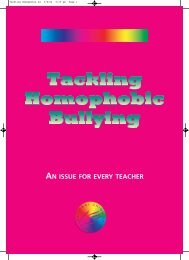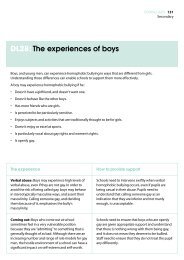- Page 1 and 2:
Non-Normative Gender and Sexual Ide
- Page 3 and 4:
Contents Dedication Acknowledgement
- Page 5 and 6:
Acknowledgements The completion of
- Page 7 and 8:
Introduction Bullying in schools on
- Page 9 and 10:
Literature Review In this review, I
- Page 11 and 12:
need to deconstruct hierarchies of
- Page 13 and 14:
Schools, Queerphobia and Heteronorm
- Page 15 and 16:
As we moved through the sixties and
- Page 17 and 18:
Experiences of young people at scho
- Page 19 and 20:
cultures of students, teachers and
- Page 21 and 22:
However, as equality strides have b
- Page 23 and 24:
perhaps subverting it, and thus all
- Page 25 and 26:
NUT also has a successful LGBT Work
- Page 27 and 28:
Stand Up For Us was therefore, the
- Page 29 and 30:
Where the School Report positively
- Page 31 and 32:
Presently however, when it comes to
- Page 33 and 34:
Methodology Research Context My rev
- Page 35 and 36:
have been provided with a broader r
- Page 37 and 38:
Questions: Having reviewed existing
- Page 39 and 40:
Name Gender Age Sexual Age left Age
- Page 41 and 42:
enhanced my work because it provide
- Page 43 and 44:
The application of my own interpret
- Page 45 and 46:
the potential to enrich my work and
- Page 47 and 48:
described a number of problems face
- Page 49 and 50:
teachers in these examples reinforc
- Page 51 and 52:
As Chris says, although schools may
- Page 53 and 54:
needs to be wariness that such resp
- Page 55 and 56:
then the school’s attitude is ‘
- Page 57 and 58:
As well as understanding these issu
- Page 59 and 60:
I obviously pick up on it all the t
- Page 61 and 62:
eacted badly to her being gay that
- Page 63 and 64:
very least, even if schools were no
- Page 65 and 66:
The visibility of LGBT History Mont
- Page 67 and 68:
Five years after Section 28’s rep
- Page 69 and 70:
ecognise and address the multiplici
- Page 71 and 72:
References Adams, N., Cox, T. and D
- Page 73 and 74:
Butler, J. (2005) Giving an Account
- Page 75 and 76:
DfES. (2003) Every Child Matters. L
- Page 77 and 78:
Gender Recognition Bill 2004. [HL]
- Page 79 and 80:
Jones, C. and Mahony, P. (eds.) (19
- Page 81 and 82:
Mullen, A. (1999) Social Inclusion:
- Page 83 and 84:
Potter, E. (1993) ‘Gender and Epi
- Page 85 and 86:
Servier, A. (2008) ‘Comment’. R
- Page 87 and 88:
Ward, N.J. (1991) White Woman Speak
- Page 89 and 90:
Appendices Contents 1. ATL ~ LGBT P
- Page 91 and 92:
Association of Teachers and Lecture
- Page 93 and 94:
Model lesbian, gay, bisexual and tr
- Page 95 and 96:
Association of Teachers and Lecture
- Page 97 and 98:
Why do we need a focus on homophobi
- Page 99 and 100:
Appendix 2 NUT ~ LGBT Resources for
- Page 101 and 102:
Tackling Homophobia A4 3/6/04 5:15
- Page 103 and 104:
Tackling Homophobia A4 3/6/04 5:15
- Page 105 and 106:
Tackling Homophobia A4 3/6/04 5:15
- Page 107 and 108:
Tackling Homophobia A4 3/6/04 5:15
- Page 109 and 110:
Lesbian and Gay A4 4/1/04 3:53 PM P
- Page 111 and 112:
Lesbian and Gay A4 4/1/04 3:53 PM P
- Page 113 and 114:
Lesbian and Gay A4 4/1/04 3:53 PM P
- Page 115 and 116:
Lesbian and Gay A4 4/1/04 3:53 PM P
- Page 117 and 118:
NATIONAL UNION OF TEACHERS FEBRUARY
- Page 119 and 120:
NATIONAL UNION OF TEACHERS FEBRUARY
- Page 121 and 122:
NATIONAL UNION OF TEACHERS JULY 200
- Page 123 and 124:
NATIONAL UNION OF TEACHERS JULY 200
- Page 125 and 126:
Model Statement on Sexual Orientati
- Page 127 and 128:
Appendix 5 School Report (2007) ~ S
- Page 129 and 130:
2Key Findings 2.1 Bullying: • Alm
- Page 131 and 132:
8 Recommendations There are ten key
- Page 133 and 134:
Appendix 7 Safe to Learn (2007) ~ E
- Page 135 and 136:
GUIDANCE 05 Executive summary 5. Wh
- Page 137 and 138:
GUIDANCE 07 Executive summary boxes
- Page 139 and 140:
DOWNLOADS 79 Downloads (DLs) DL1: W
- Page 141 and 142:
Local Government Act 1988 CHAPTER 9
- Page 143 and 144:
Local Government Act 1988 c. 9 iii
- Page 145 and 146:
Appendix 10 Interview Schedules ~ C
- Page 147 and 148:
Questions 1. Could you please tell
- Page 149 and 150:
My view: I think these issues are e
- Page 151 and 152:
emain rare. Why they are not making
- Page 153 and 154:
11.What do you think are the legaci
- Page 155 and 156:
Research Interview Consent Form I C
- Page 157 and 158:
Appendix 12 Poster sent to LGYM
- Page 159 and 160:
Appendix 13 Background Information/
- Page 161 and 162:
10 10. At what age did you ‘come
- Page 163 and 164:
16 10. At what age did you ‘come
- Page 165 and 166:
n/a 10. At what age did you ‘come
- Page 167 and 168:
10 10. At what age did you ‘come
- Page 169 and 170:
I don’t remember 10. At what age
- Page 171 and 172:
13 10. At what age did you ‘come
- Page 173 and 174:
12 10. At what age did you ‘come
- Page 175 and 176:
12 10. At what age did you ‘come
- Page 177 and 178:
16, out with friends and family at
- Page 179 and 180:
11ish 10. At what age did you ‘co
- Page 181 and 182:
13 10. At what age did you ‘come
- Page 183 and 184:
LGYM Youth Focus Group Framework 17
- Page 185 and 186:
Other Prompts: Before you were sel
- Page 187 and 188:
Appendix 15 Background Information/
- Page 189 and 190:
17 22. At what age did you ‘come
- Page 191 and 192:
HAVE YOU EXPERIENCED OR WITNESSED B
- Page 193 and 194:
Th e Co ach House 5 Hillary Place U
- Page 195 and 196:
1. Name: Sandra Jamieson 2. Years a
- Page 197 and 198:
Appendix 19 Interview Schedule ~ Ga
- Page 199 and 200:
1. Do you see homo/bi/transphobia a
- Page 201 and 202:
Examples of Policies: (only bring i
- Page 203 and 204:
Appendix 20-24 Transcripts
- Page 205 and 206:
please tell me a bit about your own
- Page 207 and 208:
U: Ur when I was at high school wha
- Page 209 and 210: B: What? AM: I thought someone want
- Page 211 and 212: U: {yeah} T: Cos I had an argument
- Page 213 and 214: {inaudible} T: …yeah but like all
- Page 215 and 216: B: Um there was rules put in place
- Page 217 and 218: T: …and I thought it were really
- Page 219 and 220: V: No… T: {Right cos in my music
- Page 221 and 222: oom with her didn’t I and they we
- Page 223 and 224: AM: …think, well actually fuck yo
- Page 225 and 226: AM:…yes you are absolutely right
- Page 227 and 228: D: …and he wasn’t totally disgu
- Page 229 and 230: B: Well I don’t actually feel com
- Page 231 and 232: V: I came out, my Mum announced me
- Page 233 and 234: V: I’m bisexual but I’m only bi
- Page 235 and 236: N: Yeah. T: And ur yeah after prima
- Page 237 and 238: D: I think a lot of older people do
- Page 239 and 240: V: I don’t know, I can be slightl
- Page 241 and 242: Interview with Silver ~ LGYM 17/06/
- Page 243 and 244: eliefs as well as their cultist lik
- Page 245 and 246: do to get rid of me, um cos I’ve
- Page 247 and 248: know now I’m on the whole gay sce
- Page 249 and 250: S: Cos if I ever got, if and when I
- Page 251 and 252: AM: Ok, ur recent research has clea
- Page 253 and 254: set down by the Government does tal
- Page 255 and 256: around trans. We are really pleased
- Page 257 and 258: curriculum there is a lot of change
- Page 259: AM: Yeah. I think that probably cov
- Page 263 and 264: AM: Ok, the next question is about
- Page 265 and 266: AM: {yes quite} SS: …so a whole b
- Page 267 and 268: with you know the implications of w
- Page 269 and 270: SS: {yes, yes, here we are in 2008
- Page 271 and 272: AM: …there’s this whole debate
- Page 273 and 274: AM: Right SS: That I’m aware of.
- Page 275 and 276: SS: No, this was about Homophobia a
- Page 277 and 278: AM: …exactly, where they’ve got
- Page 279 and 280: supposed to know about these things
- Page 281 and 282: SS: Um so there’s all that stuff
- Page 283 and 284: SS: I mean it’s I say if they wer
- Page 285 and 286: AM: …I wonder [//] same sex relat
- Page 287 and 288: AM: …gay teachers as well who are
- Page 289 and 290: AM: Um hum. Yep. SS: He also does a
- Page 291 and 292: AM …so if you’ve got a teacher
- Page 293 and 294: AM: Yeah. SS: You know there’s a
- Page 295 and 296: AM: Yes, the one you sent your coll
- Page 297 and 298: AM: And I’ve seen them before and
- Page 299 and 300: SS: …I mean he, that makes it pre
- Page 301 and 302: AM: Ok, um sort of sticking with ki
- Page 303 and 304: AM: {that’s a really good point y
- Page 305 and 306: SS: So link up for instance with um
- Page 307 and 308: Interview with Sandra Jamieson ~ Le
- Page 309 and 310: AM: So do you feel by none of them
- Page 311 and 312:
AM: Yeah. SJ: And it, you could, so
- Page 313 and 314:
AM: but by using that word as a der
- Page 315 and 316:
AM: Yeah, so how firstly how import
- Page 317 and 318:
SJ: {it seems that, cos I I say a l
- Page 319 and 320:
AM: It’s school policy it’s not
- Page 321 and 322:
SJ: Well, I think that’s another
- Page 323 and 324:
SJ: Yeah. 3 years. AM: Just complet
- Page 325 and 326:
ullying or whether it’s the gener
- Page 327 and 328:
Do you know what I mean and it’s







